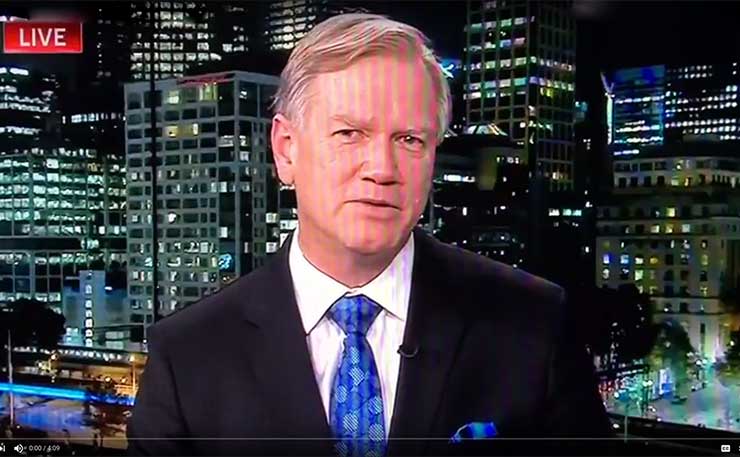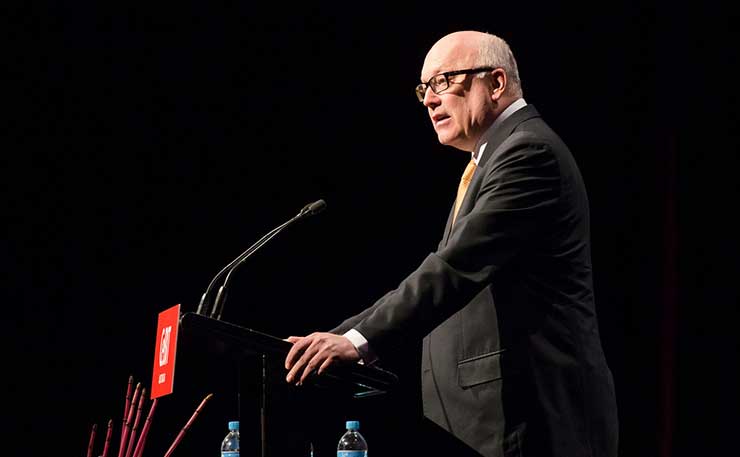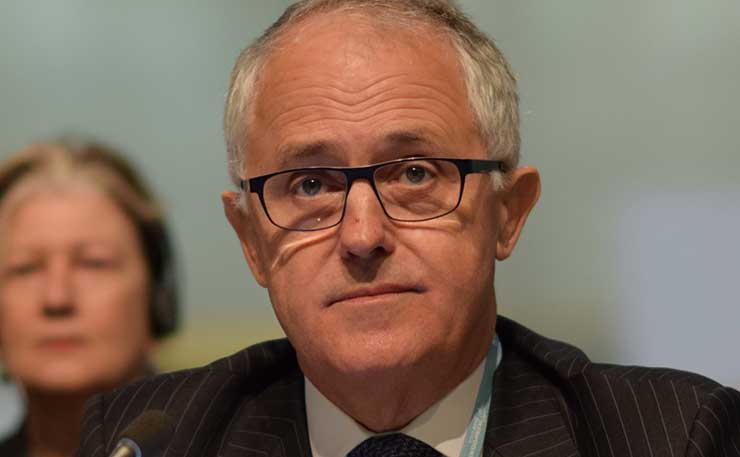Feel like your whiteness is under threat? Down in the polls? Ben Eltham looks at life under a Turnbull government with no real legislative agenda.
What is the biggest problem facing Australia in 2017? Affordable housing? Jobs and economic growth? Fair pay and penalty rates? What about climate change and the dying Great Barrier Reef? Is it energy security, and Australia’s increasingly dysfunctional electricity grid?
To judge by the actions and statements of Malcolm Turnbull’s Coalition government last week, it’s none of these things. It’s the Racial Discrimination Act, a federal law that regulates hate speech in Australia.
The government wants to amend section 18C of the Racial Discrimination Act. Specifically, it wants to water down the law, removing the words “insult, offend and humiliate” from the section, and replacing them with a much vaguer and more lenient term, “harassment”.
It’s rather hard to credit, but the Coalition government wants to make it easier for people to racially humiliate each other. Welcome to 2017.
Why does it want to do this? The answer, as with so many other puzzling decisions by the troubled Turnbull government, is due to unceasing activism from the right wing of the Liberal Party, particularly the Liberal backbench and the party base.
Egged on by the constant exhortations of the right-wing media, especially the old white men of The Australian and the old white men of Sky News, the old white men (and a few white women) of Malcolm Turnbull’s cabinet have now agreed to bring an amendment to 18C to the parliament.
Let’s not beat about the bush: this all goes back to Andrew Bolt. The decision to amend 18C marks the culmination in a long campaign by movement conservatives against the Racial Discrimination Act that began immediately after Bolt’s humiliating 2011 defeat in the federal court.

Hard cases make bad law, as the saying goes, and Eatock vs Bolt was always a strange standard bearer for the libertarian right. Not only had Bolt demonstrably engaged in racism of an unreconstructed, nineteenth century variety, he had also got most of the key facts wrong, thereby failing the test of good faith outlined in section 18D that would otherwise have protected him.
Justice Bromberg’s devastating judgment should have ended Bolt’s career as a mainstream media figure. But this is Australia, where the right of powerful white men to engage in racism remains a cherished prerogative. And so Bolt and his followers in the Institute of Public Affairs and the Liberal Party mounted a fervent campaign to attack the law that Bolt had broken. Mealy-mouthed apologists like the undistinguished Chris Berg even wrote a book about it (it was a very bad book.)
The 18C campaign has ebbed and flowed over the years, but it has never really gone away. Amending 18C was an election promise of the incoming Abbott government, only to be abandoned during Abbott’s disastrous prime ministership. The lowlight of that debate saw Attorney-General George Brandis declare to the Senate that “people do have a right to be bigots, you know.” In keeping with so many of George Brandis’ political interventions, that particular statement proved disastrous to the repeal case.
So what’s happened in 2017 to suddenly elevate 18C back to the top of the Turnbull government’s agenda? Well, nothing, really.
The sad truth of Turnbull’s second term is that the government has largely run out of things to do. Let’s face it: with the exception of company tax cuts, the Turnbull government never had much of a legislative program anyway. With most of the vital issues facing the nation – housing, energy, climate – locked away in the too hard basket, bottom-shelf issues like the Racial Discrimination Act can emerge onto the agenda.
In common with many of the issues that the Liberal right obsesses over, repealing 18C is demonstrably unpopular. To the extent that ordinary voters even know about it, they are bemused to discover that the federal government wants to water down laws against hate speech. Who would want to make racist speech easier? The Liberal Party of Malcolm Turnbull, apparently.
Not to put too fine a point on it, this is not the biggest issue facing Australian society today. Just ask Barnaby Joyce: the Deputy Prime Minister told Fairfax Radio last week that “it is definitely not the issue people are talking about in the beer garden on Friday night or at the counters of banks.”
The RDA would not appear to be a particularly onerous imposition on free speech. Even a cursory reading of the act shows that there are substantial protections contained in section 18D, specifically allowing racial speech if it is carried out in good faith by artists, scientists, academics or the media. There were a grand total of 77 complaints made under section 18C in the 2015-16 financial year, leading to just a single court case. Over the years, relatively few cases have reached the courts, and even fewer have resulted in findings of vilification.

A fine recent paper on the RDA by the University of Wollongong’s Luke McNamara and the University of New South Wales’ Katharine Gelber analysed more than 6,600 letters to newspaper editors over a 25-year period. McNamara and Gelber point out that the RDA seems not to have had any discernible “chilling effect” on prejudicial speech. Their analysis found “little evidence that public discourse has been diminished over the past 25 years”.
Indeed, perhaps the most damning argument against watering down the RDA is Bolt himself. Despite being found by the federal court to have engaged in racial vilification, Bolt has continued to write and broadcast as though nothing has happened. He still has a widely published newspaper column and his own show on cable television. “At the same time that Andrew Bolt claimed he was being ‘silenced’ by hate speech laws, he was able to disseminate his views widely through prominent media attention,” McNamara and Gelber point out.
In response, conservatives point to the recent case against a number of students at the Queensland University of Technology. This is a strange case to use to argue that the RDA is not working: the students involved were exonerated. But even if a miscarriage of justice in that case had occurred, it would hardly mean that the Racial Discrimination Act itself is to blame. We do not strike down laws just because the conduct of the courts sometimes fails plaintiffs or defendants. If that were the case, there would be few laws left on the statute books.
It’s hard to take the conservative criticisms of the Racial Discrimination Act seriously. Conservatives used to be the ones that were most interested in protecting the existing laws and morals of society. Throughout Australian history, conservative governments have been rather keen to restrict forms of speech that they didn’t like; censorship was common under Stanley Bruce and Robert Menzies. Conservatives have historically been loathe to change the rules in the name of an abstract ideal. As no less a figure than Michael Oakeshott once wrote, the true conservative will “delay a modification of the rules until it is clear that the change of circumstances it is designed to reflect has come to stay.” The 18C attack is a kind of essentialist crusade in favour of unfettered freedom of speech, an idea that few conservatives before the 1990s would have found very interesting.
If we are truly worried about freedom of expression and political action in this country, there are many graver threats than an old law limiting hate speech. In recent years the Parliament has passed onerous new anti-terror laws that include the mandatory collection and retention of every Australian’s email, phone and social media metadata. There is currently a bill before parliament which would give the government the right to shut down entire telecommunication networks, much as the rulers of countries like Egypt and Turkey have. On a more prosaic level, defamation law remains a stern civil restriction on free speech, much stronger in its remit than the RDA.
There is zero agitation by the Liberal Party to wind back defamation law, let alone to address the growing power of Australia’s security state.
Perhaps unsurprisingly, given it is largely powerful people who seem to be upset by 18C, the 18C controversy also seems to lack any analysis of the power relations at play.
It cannot be a coincidence that the sort of people who typically complain about racial vilification are members of disadvantaged and marginalised communities, while the most high profile defendant in an 18C case was a powerful white male newspaper columnist. Those pushing for the amendment of 18C seem most concerned with protecting the power of influential white men to racially insult, offend and humiliate. The dominant motivation appears to be rage against a check to long-held privilege.
As most members of a racial minority in this country can tell you, Australia certainly does have a problem with freedom of speech. The problem is we have too much of the wrong kind. There is no lack of hatred and prejudice in our society.
Making it easier for racists to racially vilify will do little to improve Australia’s civil liberties or human rights. But it might license a new wave of hate against the downtrodden and disadvantaged. Perhaps this is the true reason why powerful white conservatives are so keen to eviscerate section 18C.
Donate To New Matilda
New Matilda is a small, independent media outlet. We survive through reader contributions, and never losing a lawsuit. If you got something from this article, giving something back helps us to continue speaking truth to power. Every little bit counts.






